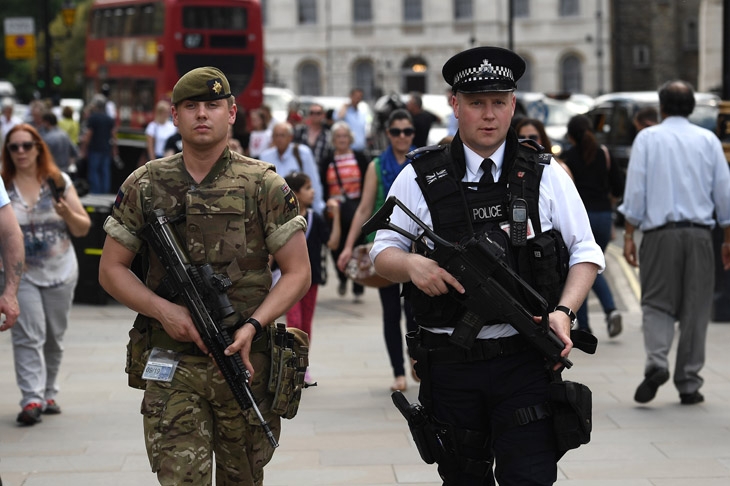Until last week, it was thought that the jihadi threat was subsiding and the security services were increasingly able to disrupt any serious plot. The recent attacks involved knives or rented cars – deadly in the wrong hands but a far cry from the 7/7 attacks, or the seven-aircraft Heathrow aircraft bomb plot thwarted in 2006.
Yet now, for the second time in our history, a suicide bomb attack has been perpetrated against the public. And this might show that things are getting worse. That as Isis is forced into retreat in Iraq and Syria, the jihadists are preparing to return to Britain with deadlier skills and tactics. While al-Qaeda focused on military and economic targets, Isis considers young girls at a pop concert to be ‘crusaders’. The terrorist threat seems to be evolving yet again.
As the threat adapts, so should our response. No politician will want to do anything which might be interpreted as trying to exploit the Manchester attacks – yet security is a valid issue in this and every other election. How we react to the threat of the jihadist menace must form part of the debate. Offering words of comfort while condemning the perpetrator is the easy part, and one that now seems to fall part of a grotesquely familiar routine repeated after every fresh atrocity. It is time to move beyond praying for Manchester, Stockholm, Nice or other similar cities – and move on to a firm discussion about how to keep these cities safe.
Fighting terrorism requires very tough, practical measures. There is a need for surveillance, raids, arrests and incarceration, however ugly they might sometimes be. But as the intelligence services are the first to point out, they can never tackle terrorism on their own. They require the co-operation of the communities in which the terrorists shelter, and of those who offer tip-offs (a concerned family member, for instance, is understood to have prompted police to arrest a terror suspect last month in Westminster). So often the heroes of counter-terrorism operations are those Muslim families, friends, neighbours and acquaintances who, when they suspect someone close of planning a terror attack, overcome their sense of loyalty and choose to report their suspicions.
It is, of course, nonsense to say that jihadism has nothing to do with Islam. Nor can one downplay the numbers potentially involved: the intelligence services’ watch list now includes 3,000 names. The vast majority of Muslims certainly do denounce terrorism, but those who don’t represent a worryingly large pool of people. A survey last year showed four per cent of British Muslims expressing sympathy for terrorists, against just one per cent for the general population.
Yet the same survey found that Muslims are more likely than non-Muslims to say they ‘belong strongly to Britain’ — and that an overwhelming majority believe it’s important to integrate into British life. And they do. But if their children grow up feeling that they are regarded as potential terrorists, by dint of their faith or skin colour, this would bring on precisely the clash of civilisations that the Islamists want.
So this is the tightrope that a government must walk. If Muslims know someone is planning a violent act but feel insufficiently motivated to do anything about it, then we are losing the fight against terror. We also lose that fight if we are politically oversensitive to the point that we refrain from conducting the necessary policing to observe and apprehend suspects.
No party owns this subject. Much will be made, and deserves to be made, of Jeremy Corbyn’s past closeness with terror groups such as the IRA or Hamas, the latter of which he notoriously described as his ‘friends’. That he has chosen this week to claim that the West is reaping what it has sown, that the terror attacks are some kind of repayment for our foreign policy, is contemptible – but at least makes clear which side of the debate he is on.
But Theresa May’s spell as home secretary was not entirely glowing. It was characterised by the rightful determination to overcome the absurdities of the human rights courts and deport terror suspects, she often overreacted with legislation. Her Counter-Terrorism and Security Act, which placed a duty on public servants to report suspicions of terrorist activities, led to bizarre cases such as a ten-year-old boy being descended upon by police after he made a spelling error and wrote that he lived in a ‘terrorist house’ rather than a ‘terraced house’.
Further draconian measures to make it an offence to express ‘non-violent extremism’ and to challenge ‘British values’ have been held up by the inability of government lawyers to define those things. Loosely worded laws can be used to suppress the views of anyone who lies slightly outside mainstream public opinion, which in largely secular modern Britain risks making a public enemy of anyone with a strong religious belief. Meanwhile, we have perfectly good existing laws against conspiracy to murder and incitement to violence which can be used to tackle those who encourage but who do not take part in terrorist acts.
The tricky is deciding how to balance the opposing needs of security and liberty. With just two weeks to go until polling day, an election campaign that has so far failed to move beyond clichés should now turn to this subject: how to find the right language, the correct response, and how to apply a deft legislative touch. We should ask where we have gone wrong so far, and what ought to be done now. There is no better time to have this conversation.






Comments